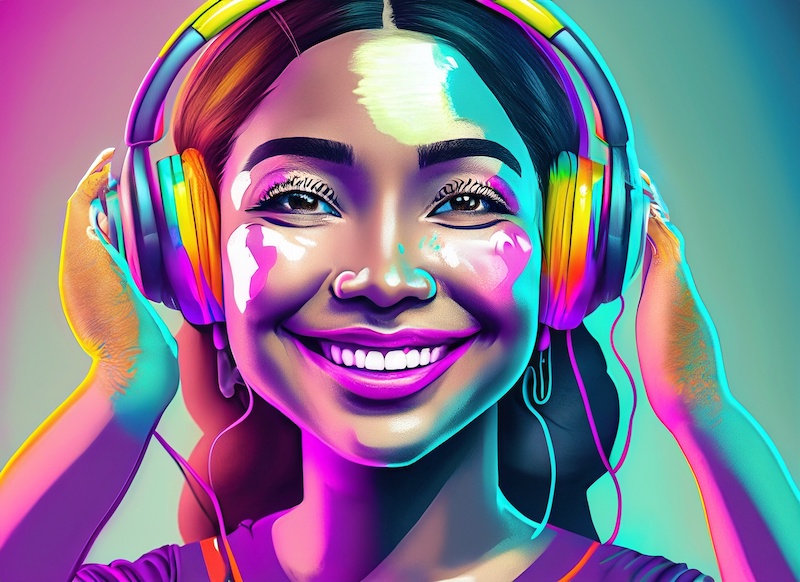Remember when the electric guitar made its debut and suddenly every garage band was rocking out harder than ever?🎸AI is to today’s music what the electric guitar was to the rock ‘n’ roll era – a game changer that is amplifying the sound of everyday musicians like you!
Spotify’s CEO, Daniel Ek, recently chimed in on this AI-powered musical revolution, describing it as “both really cool and scary.” It’s like watching your cat play the piano; it’s impressive, but there’s a tiny part of you wondering if this might be the beginning of a feline world takeover.😼
But Spotify isn’t the only one tuning into the AI beat. Another music streaming juggernaut is diving headfirst into this brave new world, gearing up to release a staggering 200,000 AI-generated tracks. This isn’t just a fleeting trend; it’s a full-blown musical movement. The rapid emergence of AI voice in the music scene isn’t just reshaping the industry; it’s offering you, dear reader, a front-row seat and a chance to be a part of this revolutionary wave.
Imagine the possibilities! No longer do you need to grapple with complex music production tools. Want your track to sound “a little more upbeat”? Just tell your AI. Fancy some congas in the background? Just ask. As Ek envisions, artists can now embark on a “creative journey” with AI as their co-pilot, making music creation as simple as voicing a command. The future of music is here with voice AI platforms like Covers.ai, and it’s waiting for you to hit ‘play.’
The Rise of AI Voice in Music
But first, some definitions…
AI Voice – noun
A technology that utilizes artificial intelligence algorithms to generate, modify, or enhance vocal outputs, often producing vocals that can mimic human voices or create entirely novel sounds and styles. Commonly used in music production, voice assistants, and other audio applications.
Anyone else find themselves nodding off while reading that definition? 🥱
AI Voice – noun
That thing where computers get all chatty and start spitting bars or just casually chatting like they’re one of the squad. It’s like tech got a glow-up and now can sound freakishly human. Commonly used everywhere from bops to Siri’s latest gossip.
Okay, that one’s better!
In the realm of music, AI voice is like the conductor orchestrating a symphony of sounds, but with a digital twist. At its core, AI voice leverages artificial intelligence to generate, modify, and enhance vocal outputs. But what does this mean for the everyday listener or budding musician?
AI voices can mimic, adapt, and even create unique vocal patterns, tones, and styles. Gone are the days when music was solely the domain of those with vocal prowess or instrumental expertise. With AI voice, the barriers to entry are lowered, allowing anyone with a passion for music to experiment and create.
The technology behind AI voice is rooted in deep learning algorithms that analyze vast amounts of vocal data. By understanding the nuances of pitch, tone, and rhythm, these algorithms can generate vocals that are indistinguishable from human voices. But it’s not just about replication; it’s about innovation. AI voice can produce sounds and styles that are entirely novel, pushing the boundaries of what we traditionally understand as music.
In the broader context of the music industry, AI voice is a game-changer. It offers artists new tools to enhance their creations, gives listeners more personalized experiences, and democratizes music production, making it accessible to all. But let’s not get ahead of ourselves…
The Bigger Picture: AI’s Resounding Impact on Music
The music industry has always been a hotbed for innovation. From the phonograph to the Walkman, and now to AI voice, each technological leap has reshaped how we create, consume, and connect with music. Today, AI voice stands at the forefront of this evolution, promising to redefine the boundaries of musical creativity.
The CEO of Spotify spoke to AI’s potential to help people create music without having to understand complicated music production tools. Artists could instruct the AI to shape their music to fit into a certain genre or incorporate a certain instrument (the world needs more harmonica, am I right??) This level of customization extends to listeners too. Imagine adjusting a song’s tempo or adding instruments on the fly, crafting a unique listening experience every time.
But it’s not just about individual artists. Major platforms are recognizing the seismic shift AI brings. YouTube, for instance, is actively exploring ways to compensate artists and rights holders for AI-generated music. This move underscores the platform’s commitment to ensuring that as AI becomes a more integral part of the music ecosystem, creators are fairly rewarded for their contributions.
Grimes, the avant-garde musician, has also weighed in on the AI music debate. In a recent interview, she suggested that streaming platforms like Spotify should consider creating dedicated sections for AI-generated music. Such a move would not only validate AI’s place in the music world but also provide listeners with a curated space to explore these new landscapes.
Personalizing Your Experience with AI Voice
We’ve zoomed out to get the big picture on AI voice within the music industry, now let’s zoom in to see how AI voice fits into your bedroom jam sessions…
Imagine a world where your favorite songs on Spotify are tailored just for you. Where the vocals can be adjusted to match your mood, or even your own voice. This is the potential of AI voice in music.
Furthermore, with platforms like Covers.ai, music enthusiasts can take their passion to the next level. Whether you’re a budding artist or just someone who loves to sing in the shower, AI voice offers a unique opportunity to experiment, create, and share your musical creations. And as streaming platforms like Spotify continue to integrate AI voice capabilities, the line between artist and listener will blur, fostering a more interactive and immersive musical landscape.
Covers.ai: Building the Future of Music with AI
Imagine constructing your dream home. You wouldn’t just want a screwdriver; you’d need the entire toolbox, right? Enter Covers.ai, not just a mere tool but the architect, builder, and interior designer of your musical dreams. It’s the jackhammer breaking through old sound barriers, the blueprint for your next auditory masterpiece, and the craftsman ensuring every note is perfectly placed.👷
Traditional sound editing? Think of it as painstakingly laying bricks by hand. Effective, but oh-so-time-consuming. Covers.ai, however, is like having a state-of-the-art construction crew. With its AI prowess, it streamlines the process, taking the raw materials of your voice and crafting a skyscraper of sound. 🏙️Whether it’s refining vocals, creating AI covers, or producing original tracks, Covers.ai is your one-stop construction site.
The foundation of Covers.ai? A cutting-edge algorithm that knows the intricacies of the human voice. It doesn’t just slap on a new coat of paint; it renovates and reshapes, ensuring the final product isn’t just new but authentically you. And with its intuitive design, both the seasoned architect and the DIY enthusiast can find their way around.
In the bustling cityscape of today’s music industry, having a unique skyline is essential. Covers.ai provides that distinctive silhouette, enabling artists to design and innovate like never before. It’s more than just laying down tracks; it’s about constructing immersive soundscapes that leave listeners in awe.
So, as we blueprint the future of AI in music, it’s evident that Covers.ai is the leading architect. Ready to build your musical legacy? Let’s dive into how you can craft your unique AI voice for platforms like Spotify and truly make your mark in this new musical frontier.
5 Steps to Crafting Your Unique AI Voice for Spotify
1. Understand Your Voice’s Unique Qualities
Before diving into the world of AI voice manipulation, it’s essential to understand the natural qualities of your voice. Are you a baritone or a soprano? Do you have a raspy texture or a clear tone? Recognizing your voice’s strengths and areas for enhancement will guide your AI voice journey.
2. Choose the Right AI Voice Tool
There are numerous AI voice tools available, but not all are created equal. For those looking to craft a voice for Spotify, Covers.ai stands out as a top choice. With its advanced algorithms and user-friendly interface, it’s designed to cater to both novices and professionals.
3. Experiment with Different Styles and Effects
The beauty of AI voice technology lies in its versatility. Want to sound like a vintage radio announcer or a futuristic robot? The sky’s the limit! Play around with different effects, pitches, and modulations. Remember, it’s all about finding a sound that resonates with your musical vision.
4. Integrate with Your Music Production Software
Once you’ve crafted your unique AI voice, it’s time to integrate it with your music production software. This step ensures that your AI-enhanced vocals blend seamlessly with your tracks, creating a harmonious and professional sound.
If you’re new to the realm of music creation, though, don’t fret if you don’t have any fancy tech. One of the greatest strengths of Covers.ai is that you can use it to do as much or as little of the music production as you want!
5. Share and Get Feedback
Before releasing your AI-enhanced tracks on Spotify, share them with friends, family, or fellow musicians. Constructive feedback can offer insights into how your AI voice is perceived and any tweaks that might enhance its appeal. Remember, music is a shared experience, and understanding your audience’s perspective can be invaluable.
Crafting a unique AI voice for Spotify is an exciting journey that blends technology with creativity. By following these steps and embracing the possibilities of AI, artists can redefine their sound and offer listeners a fresh and innovative auditory experience.
FAQ: AI Voice and Crafting Your Unique Sound for Spotify
1.What is AI Voice?
It’s when tech gets a major glow-up and uses smart algorithms to chat, sing, or drop beats. AI Voice can sound superhuman, mimic your fave artists, or even create fresh, never-heard-before vibes. It’s popping up in everything from your top Spotify tracks to voice assistants dishing out the latest tea. ☕
2. Why should I use AI Voice for my Spotify tracks?
AI Voice isn’t just a trend; it’s the next big thing in music. It lets you experiment, innovate, and create unique sounds that can make your tracks stand out. Plus, with platforms like Covers.ai, you get tools that make the process smooth and fun.
3. How does Covers.ai fit into the AI Voice scene?
Covers.ai is like the leading architect in the AI music world. It’s not just a tool; it’s a whole construction crew ready to help you build your musical dreams. From refining vocals to producing original tracks, Covers.ai is your go-to platform.
4. Is AI Voice just for professional musicians?
Nah, fam! Whether you’re a seasoned artist or just someone who loves belting out tunes in your car, AI Voice is for everyone. It’s all about breaking barriers and letting everyone get a taste of music creation.
5. How do I get started with crafting my AI Voice for Spotify?
Start by understanding your voice, choose the right AI tool (hint: Covers.ai is a top pick), play around with styles, integrate with your music software, and always share to get feedback. Dive in and make some noise!

